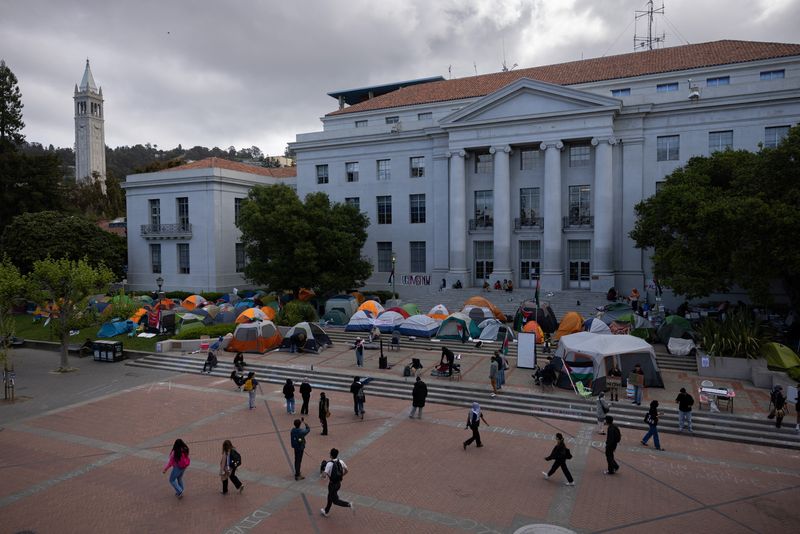By Andrew Hay
(Reuters) - At Columbia University, tensions between the administration and students protesting over Israel's war in Gaza have reached the point that scores of New York City police marched onto campus to clear an encampment and arrest demonstrators who had commandeered a classroom building.
It was the second time in as many weeks that the administration has called on police to control the protests. Students have been suspended, and threatened with expulsion. Police are now stationed around-the-clock on campus.
Nearly three thousand miles away at the University of California, Berkeley, the scene has been far different. Student demonstrations have so far taken place without arrests or disruption of campus operations.
The contrast in how protests have played out at the two prestigious institutions - both with long histories of student activism - illustrates the range of factors at play in how school administrations, students and the police navigate what can quickly turn into a full-blown crisis.
South of Berkeley at UCLA, part of the same university system, police on Thursday morning flattened a pro-Palestinian camp, a day after it was attacked by pro-Israel counter protesters. Authorities at the Los Angeles school had declared the encampment an unlawful assembly.
Similar crackdowns have occurred at colleges across the country, from Arizona State to Virginia Tech and Ohio State to Yale. Police have arrested around 2,000 campus protesters to date.
Still, some universities - including Berkeley, Northwestern (NASDAQ:NWE) and Brown - have managed to avoid confrontations between the police and students.
Education experts say these cases offer lessons in keeping tensions from boiling over, a key one being a university's experience with balancing student activism against pressure from donors, interest groups and politicians.
Berkeley Chancellor Carol Christ has allowed students to maintain a protest space on campus since they began erecting tents April 22 on the steps of Sproul Hall, where Martin Luther King gave a 1967 civil rights speech. Dan Mogulof, a spokesman for the university, said that remained the case Thursday, despite a scuffle Wednesday evening between the co-founder of a Zionist activist group and a pro-Palestinian protester. It was the first violence after days of peaceful assembly.
"We are urging everyone to avoid engaging in pointless provocation and physical conflict," Mogulof said, adding that Christ was in talks with encampment leaders after the Wednesday incident led to three minor injuries. He said the school would respond to violence in line with University of California policy.
That guidance tells administrators to avoid police involvement unless it's absolutely necessary and the physical safety of students, faculty and staff is threatened. That policy is rare, with most universities having some kind of regulation that prohibits permanent encampments or outlaws overnight student activities on campus.
The University of California system has seen in the past where police involvement can lead.
In a 2011 Berkeley protest during the Occupy movement against economic inequalities, campus police clubbed and jabbed students with batons. Then-Chancellor Robert J. Birgeneau later apologized, and the UC system shifted to the policy of restraint Berkeley spokesman Mogulof described.
Amid current protests, administrators across the country are seeking to ease tensions with talk. In Illinois, Northwestern University reached a deal with protesters to remove tents and sound systems in return for a new advisory committee on investments, a key policy for students who object to their school's financial ties to companies that back Israel's government.
Protesters at Brown University in Rhode Island also agreed to take down their encampment in return for a vote by the college's corporation on whether to divest funds from companies tied to Israel's military attacks on Gaza.
Still, some deals have failed to resolve tensions. While Portland State University in Oregon agreed to pause donations from Boeing (NYSE:BA), a company that makes attack helicopters used in Gaza, students there have nonetheless occupied the library, scrawling messages like "END GENOCIDE NOW" on windows.
Other factors at play as institutions navigate balancing free speech and campus security include how students react to daily developments in the Middle East as well as those at other campuses in the United States.
Columbia has often proven to be a beacon for protest movements at other universities. President Minouche Shafik has said the campus has become "intolerable," citing factors ranging from antisemitic language to loud protests going into the night.
"One group’s rights to express their views cannot come at the expense of another group’s right to speak, teach, and learn," Shafik said in a Monday statement.
Adversaries of pro-Palestinian protesters accuse them of antisemitism, a claim Columbia student protesters and their faculty advocates strongly deny.

Free-speech attorney Zach Greenberg said no matter how hateful or offensive the speech on campuses, it was not a justification for police crackdowns.
"It's always better to counter the speech you dislike with more speech," said Greenberg, a program leader at the college campus rights advocacy group FIRE.